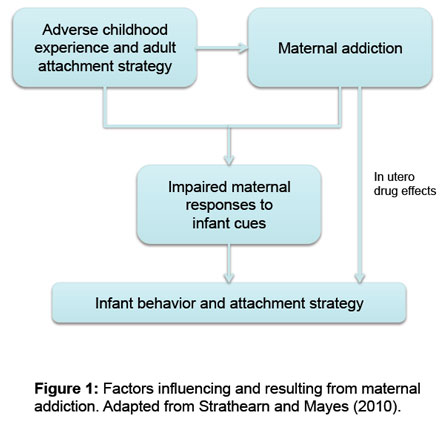Maternal addiction: Does attachment play a role?

Lane Strathearn
Maternal addiction is a serious problem with long lasting consequences for children’s social, emotional and cognitive development. Mothers who abuse substances have higher rates of reported child abuse, neglect and foster care placement. There is evidence that drugs such as cocaine may affect infant development both directly, via in utero exposure, and indirectly via alterations in maternal caregiving patterns (Strathearn and Mayes, 2010).
Most drugs of abuse activate so-called “reward systems” in the brain, releasing the neurochemical dopamine that potentially conditions and reinforces these patterns of drug-taking behavior (Kufahl et al., 2005). Interestingly, when mothers respond to their own infant’s cues, such as smiling faces, they engage some of the same reward processing regions in the brain that are activated by drugs of abuse (Strathearn et al., 2008). This leads to the question of whether these drugs may “high-jack” the same reward processing systems in the brain, making them less responsive to more “natural” reward cues, such as their infant’s behaviors and facial expressions. Reduced reward response when interacting with one’s baby may predispose a mother to neglect or even abuse her child.
 Research has demonstrated that the quality of parenting care received in infancy may program the development of these reward systems in the brain (Champagne et al., 2004; Pruessner et al., 2004). Therefore, an alternate explanation for the association between addiction and child maltreatment may be that a mother’s own experience of abuse or neglect alters the development of these reward processing brain structures, making these mothers less responsive to their own infants cues, and more vulnerable to the effects of artificial stimulants such as cocaine.
Research has demonstrated that the quality of parenting care received in infancy may program the development of these reward systems in the brain (Champagne et al., 2004; Pruessner et al., 2004). Therefore, an alternate explanation for the association between addiction and child maltreatment may be that a mother’s own experience of abuse or neglect alters the development of these reward processing brain structures, making these mothers less responsive to their own infants cues, and more vulnerable to the effects of artificial stimulants such as cocaine.
In other words, mothers who have experienced early life neglect or trauma may experience diminished natural reward (to normal social interactions including infant cues) and therefore be at greater risk of developing an addiction when exposed to chemicals that intensely stimulate these brain responses. The mother’s lack of responsive caregiving to her own infant may then perpetuate the cycle into the next generation, via changes in the infant’s neural development and behavior.
In the Attachment and Neurodevelopment Lab at Baylor College of Medicine, we are currently examining these important questions, comparing a cohort of 200 mothers with addiction problems with 200 matched control subjects, along with their 6 to 7 month old infants. We are assessing the mothers’ own childhood experience and dispositional representations using the DMM Adult Attachment Interview, and then perform functional MRI brain scans to compare maternal brain responses to their infants’ face and cry cues (Figure 1).
Ultimately, we hope that this research will lead to a better understanding of how adverse early life experiences may contribute to adult patterns of caregiving, as well as susceptibilities to addiction, which may further impair parenting capacities. Understanding how cocaine exposure interacts with other environmental factors to influence maternal behavior may help us both to better respond to addiction, and prevent long-term consequences in children—which may itself include an increased vulnerability to addiction.
Lane Strathearn, MBBS FRACP Ph.D
References
Champagne, F.A., Chretien, P., Stevenson, C.W., Zhang, T.Y., Gratton, A., & Meaney, M.J. (2004). Variations in nucleus accumbens dopamine associated with individual differences in maternal behavior in the rat. Journal of Neuroscience, 24, 4113-4123.
Kufahl, P.R., Li, Z., Risinger, R.C., Rainey, C.J., Wu, G., Bloom, A.S., & Li, S.J., (2005). Neural responses to acute cocaine administration in the human brain detected by fMRI. NeuroImage, 28, 904-914.
Pruessner, J.C., Champagne, F., Meaney, M.J., & Dagher, A., (2004). Dopamine release in response to a psychological stress in humans and its relationship to early life maternal care: A positron emission tomography study using [11C]raclopride. Journal of Neuroscience, 24, 2825-2831.
Strathearn, L., Li, J., Fonagy, P., & Montague, P.R., (2008). What’s in a smile? Maternal brain responses to infant facial cues. Pediatrics, 122, 40-51.
Strathearn, L., & Mayes, L.C. (2010). Cocaine addiction in mothers: Potential effects on maternal care and infant development. Annals of the New York Academy of Sciences, 1187, 172-183.
Suggested Citation: Strathearn, L. (2012, May). Maternal addiction: Does attachment play a role? DMM NEWS, 12. Retrieved from https://www.iasa-dmm.org/newsletter/view/march_2012_-_maternal_addiction_does_attachment_play_a_role/